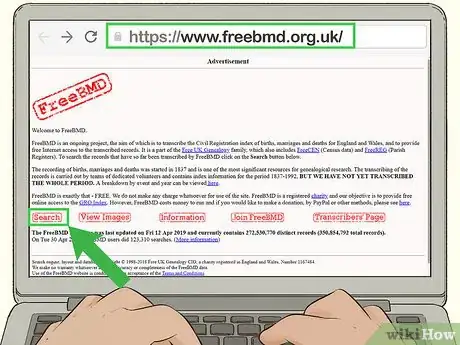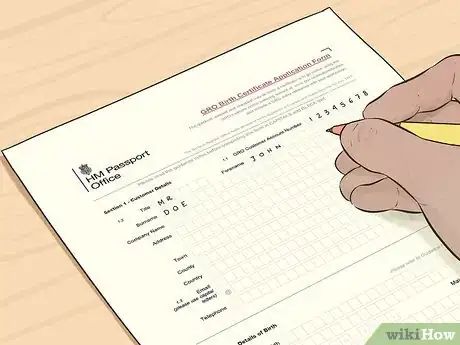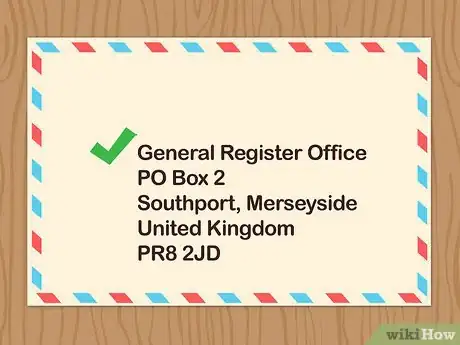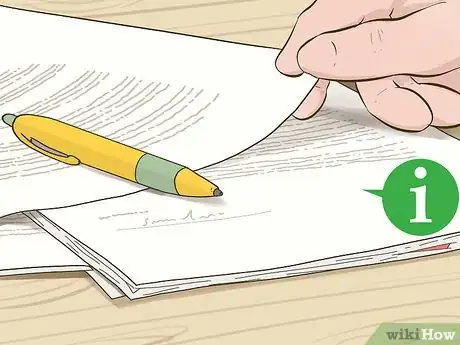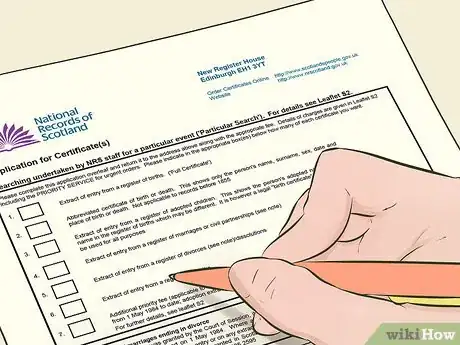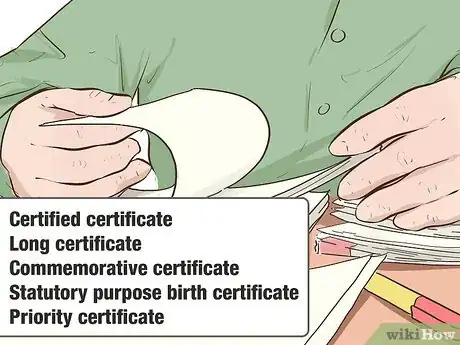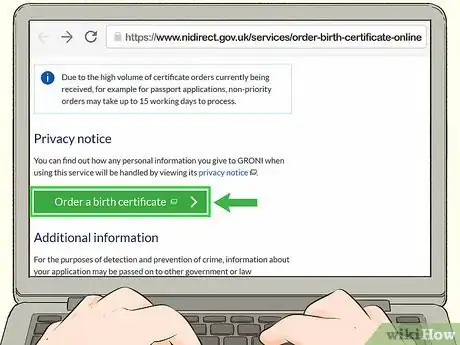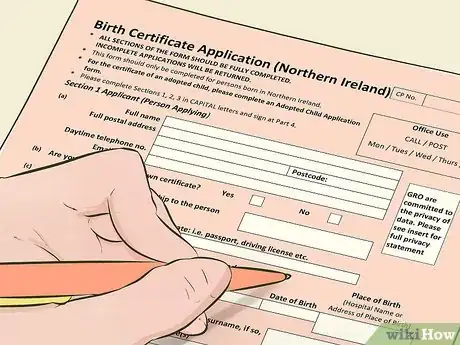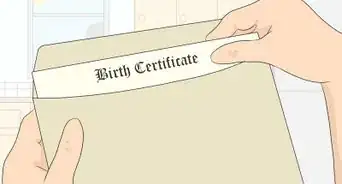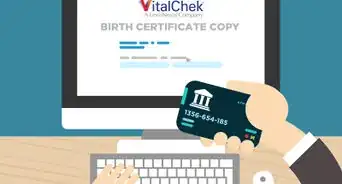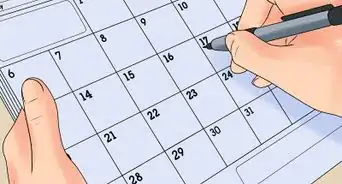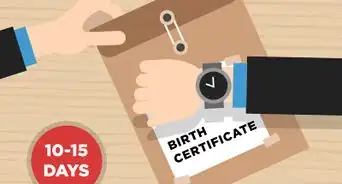This article was co-authored by wikiHow staff writer, Jennifer Mueller, JD. Jennifer Mueller is a wikiHow Content Creator. She specializes in reviewing, fact-checking, and evaluating wikiHow's content to ensure thoroughness and accuracy. Jennifer holds a JD from Indiana University Maurer School of Law in 2006.
There are 10 references cited in this article, which can be found at the bottom of the page.
This article has been viewed 31,477 times.
Learn more...
If you're applying for a passport or other government services in the UK, either for yourself or your child, you'll likely need a birth certificate. If you weren't born in the UK, you may need a copy of the birth certificate of a parent or grandparent born in the country. You may also want the birth certificate of an ancestor if you're researching your family tree. The process of getting a copy of a birth certificate in the UK differs depending on whether you need a birth certificate from England and Wales, Scotland, or Northern Ireland.[1]
Steps
England and Wales
-
1Find the GRO index reference number. You can search historical births on the GRO website or at https://www.freebmd.org.uk/, which has records through 1992. Your fee for a copy of a birth certificate is only £11 if you have this number. Otherwise, you'll have to pay an additional £3 for the search.[2]
- For births after 1992, or if you can't find the GRO index reference number online, you can order the certificate from the local register office where the birth took place and save the additional £3 fee.
-
2Register on the General Register Office (GRO) website to order online. Go to https://www.gro.gov.uk/gro/content/certificates/Login.asp and click the link to register as an individual. You'll need a valid email address as well as your full name and postal address to register an account.[3]
- You can also order a copy of the certificate at the local register office in the district where the birth took place. If the birth took place in the last 6 months, you can only order a copy through the local register office.[4]
- To locate the appropriate register office, enter the postcode where the birth took place at https://www.gov.uk/register-offices.
Advertisement -
3Complete the birth certificate application form to order by mail. If you can't or don't want to order a copy online, you can mail in the paper form instead. You must fill out the paper form in black ink using all capital letters.[5]
- You can download a paper copy of the application at https://www.gov.uk/government/publications/general-register-office-gro-certificate-application-forms, as well as guidance notes for filling out the application. Read the guidance notes carefully before you start filling out the form.
- The application requires you to provide your information, including your name and address, as well as details about the birth.
- Enter as much information as you have. The more information you have, the easier the search will be and the quicker you'll get your copy.
-
4Submit your application to the GRO. If you order online, you can submit your application as soon as you've finished. You will need a major credit or debit card to pay the application fee. If you are mailing in a paper application, you can pay by credit or debit card, cheque, or postal order.[6]
- If you're sending in a paper application, enter your payment information directly on the application. Be sure to include the cheque or postal order in the envelope with your application. To pay by credit or debit card, write on your application the card number, security number, date of expiration, and name of the cardholder as it appears on the card.[7]
- Mail paper applications to General Register Office, PO Box 2, Southport, Merseyside, United Kingdom, PR8 2JD.
Tip: You can also submit an application by phone and pay fees with a major credit or debit card. Call 0300 123 1837. Phone lines are open Monday through Friday from 8 a.m. to 8 p.m. and Saturday from 9 a.m. to 4 p.m.
-
5Wait to receive your certificate in the mail. If you have the GRO index reference number, your certificate will be sent within 4 days after you apply. Without that number, your certificate will be sent 15 working days after your application is received.[8]
- If you need the certificate sooner, pay £35 to use the priority service. As long as you order by 4 p.m., your certificate will be sent on the next working day.
Scotland
-
1Gather information about the birth. Generally, you will need the full name of the person whose birth certificate you want, as well as the date and place of their birth. If the person has a common surname, you may also need additional information, such as the names of the person's parents.[9]
- For certificates from the Old Parish Registers, you need the full name, date or year, parents' names, and place of birth.
- While all information isn't necessarily required, the search for the right birth certificate will be quicker and more accurate the more information you provide.
-
2Search the indexes and order copies of birth certificates online. To search online, go to https://www.scotlandspeople.gov.uk/ and click on the option to "order official certificates and copies." You can then run a certificate search.[10]
- Order a certificate (called an extract in Scotland) if you need the certificate to apply for a passport or for another legal reason. If you're doing genealogical research or composing your family tree, you can order a copy instead. Copies are digital images. The fees are significantly lower than those for certificates and you'll get them immediately.[11]
- The ScotlandsPeople website uses a system of credits to view and download digital images. Credits are available in batches of 30 (£7.50) or 40 (£10) and can be ordered at https://www.scotlandspeople.gov.uk/buy-credits. Copies of birth records cost 6 credits, or £1.50 each.[12]
- When you run your search and find the certificate you need, you'll have the option to order it immediately. You will need a major credit or debit card to complete your order. Fees are £12 per certificate.
Tip: You can also order a post-1855 birth certificate by phone with a credit or debit card. Call 0131 314 4411. The number is open Monday through Friday from 9:00 to 16:30, except on public holidays.
-
3Go to a local registrar if you want to apply in person. You can fill out a paper application at the local registrar where the birth took place. This may be a better option if you don't have a credit or debit card, or if you want to pay in cash. The fee is only £15 if applying in person.[13]
- Contact information for local registrars is available at https://www.nrscotland.gov.uk/files//registration/reglist.pdf.
-
4Complete Form SU3 if you want to order a certificate through the mail. You can download a copy of the form at https://www.nrscotland.gov.uk/files//registration/form-su3-2016.pdf. Print it out and fill it out in black ink.[14]
- If applying by mail, include a fee of £15. You can pay with a credit or debit card, or with a sterling cheque that is crossed and made payable to "Scottish Government." Do not send cash through the mail.
- Mail your completed form and fee to New Register House, Edinburgh EH1 3YT.
-
5Use the ScotlandsPeople Centre to search historical records. If you're working on genealogical research, you can book a search place at the ScotlandsPeople Centre in central Edinburgh. The Centre also provides access to Catholic parish registers, Coats of Arms, and other historical records of genealogical significance.[15]
- To book a search room seat, you must be a registered member of the ScotlandsPeople website. You can then use the online booking system to register from your account. Registration is free. Simply go to https://www.scotlandspeople.gov.uk/ and click on the green "Register" button.
- A pass to search for a day costs £15. You can order official birth certificates for £10.
-
6Wait to receive your certificate in the mail. If you apply online, your certificate will be mailed to you within 15 working days. If you apply by mailing in a written application, your certificate will be mailed within 8 working days of receipt of your application.[16]
- Certificates are sent by 1st class UK mail unless you select a different option when you apply. Other options require payment of additional fees.
Tip: If you need the birth certificate sooner, use the priority service to have it available as soon as the next day. Priority services cost an additional £27 if applying online or £30 if applying in person.
Northern Ireland
-
1Choose the type of certificate you want. Northern Ireland issues 6 different types of birth certificates. Each type is used for different purposes – they are not interchangeable. The type you choose also determines how you can order it. The 6 basic types of birth certificates are:[17]
- Certified certificate: A certified copy may be required for immigration purposes, such as applying for a visa in another country
- Long certificate: Necessary for driving license and passport applications
- Short certificate: Generally only acceptable as proof of age; does not show details about the parents
- Commemorative certificate: A special printing mounted and framed in a presentation box; does not have any legal or evidentiary value
- Statutory purpose birth certificate: A certificate needed for education or social security purposes; available at a reduced fee if you submit proof of the statutory purpose
- Priority certificate: One needed urgently that requires payment of an additional fee. You can order any certificate type as a priority certificate.
-
2Order the certificate online with a credit or debit card. You can order all types of birth certificates online, except statutory purpose certificates, at https://www.nidirect.gov.uk/services/order-birth-certificate-online. Fees are £15 for a single certificate or £40 for a commemorative certificate. You'll pay an additional £20 for a priority certificate. Before you begin, make sure you have the following information:[18]
- Full name of the person whose birth certificate you need;
- Date and place of birth (district, street, or town);
- Names of parents (including mother's maiden name); and
- Mother's address at the time of birth.
Tip: You can also order a certificate by phone with a credit or debit card. Call 0300 200 7890. If you order a certificate by phone, you will not be able to go collect it in person. You will have to wait for it to be mailed.
-
3Complete the print application to order by mail or in person. Download and print the application from https://www.nidirect.gov.uk/publications/birth-certificate-application-form. Fill the form out completely using black ink. Statutory purpose certificates must be ordered by mail or in person since you must also provide a letter attesting to that purpose.[19]
- If you're mailing your application, include a cheque or postal order for payment of the fee, made payable to "The Registrar General." Fees for ordering by mail or in person are the same as ordering online: £15 for a single certificate, £8 for a statutory purpose certificate, or £40 for a commemorative certificate. You can pay an additional £20 for a priority certificate.
- If you're ordering a birth certificate for a statutory purpose, you must include a letter issued by the Social Security Agency or the Education and Library Board with your application.
-
4Wait for your certificate in the mail or collect it in person. As of 2019, a high volume of requests means that it may take up to 20 days to process your non-priority order. Priority orders will typically be processed within a day.[20]
- Both priority and non-priority orders will take up to 5 working days to be delivered to an address in the UK from the date they're issued, unless you pay extra for next-day delivery. Outside the UK, international standard delivery could take up to 4 weeks.
- If you want to pick up your certificate in person, apply to the General Register Office in Belfast. Priority certificates may be processed while you wait, typically within 20 to 30 minutes. Non-priority certificates will be available for collection 3 working days after your application.
References
- ↑ https://www.gov.uk/order-copy-birth-death-marriage-certificate
- ↑ https://www.gov.uk/order-copy-birth-death-marriage-certificate#other-ways-to-apply
- ↑ https://www.gov.uk/order-copy-birth-death-marriage-certificate
- ↑ https://www.gro.gov.uk/gro/content/certificates/
- ↑ https://assets.publishing.service.gov.uk/government/uploads/system/uploads/attachment_data/file/773641/Birth_2_2019__2_.pdf
- ↑ https://www.gov.uk/order-copy-birth-death-marriage-certificate#other-ways-to-apply
- ↑ https://assets.publishing.service.gov.uk/government/uploads/system/uploads/attachment_data/file/773641/Birth_2_2019__2_.pdf
- ↑ https://www.gov.uk/order-copy-birth-death-marriage-certificate#other-ways-to-apply
- ↑ https://www.nrscotland.gov.uk/registration/how-to-order-an-official-extract-from-the-registers
- ↑ https://www.nrscotland.gov.uk/registration/how-to-order-an-official-extract-from-the-registers
- ↑ https://www.scotlandspeople.gov.uk/content/certificates-and-copies
- ↑ https://www.scotlandspeople.gov.uk/content/our-charges
- ↑ https://www.nrscotland.gov.uk/registration/how-to-order-an-official-extract-from-the-registers
- ↑ https://www.nrscotland.gov.uk/registration/how-to-order-an-official-extract-from-the-registers
- ↑ https://www.nrscotland.gov.uk/research/visit-us/scotlandspeople-centre
- ↑ https://www.nrscotland.gov.uk/registration/how-to-order-an-official-extract-from-the-registers
- ↑ https://www.nidirect.gov.uk/articles/ordering-life-event-certificates
- ↑ https://www.nidirect.gov.uk/articles/ordering-life-event-certificates
- ↑ https://www.nidirect.gov.uk/articles/ordering-life-event-certificates
- ↑ https://www.nidirect.gov.uk/articles/ordering-life-event-certificates
- ↑ http://www.legislation.gov.uk/ukpga/Eliz2/1-2/20
